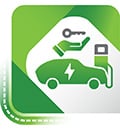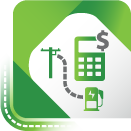EVI-X Modeling Suite of Electric Vehicle Charging Infrastructure Analysis Tools
NLR's EVI-X modeling suite informs the planning and development of large-scale electric vehicle (EV) charging infrastructure projects—from the regional, state, and national levels to site and facility operations.
Three Types of Tools
Network Planning
Use these tools to quantify charging infrastructure needs such as:
- Number, type, and location of charging ports
- Recommended power levels and grid impacts
- Practical control strategies to counter EV charging loads
- Affordable charging
- Optimized charging for fleets and ride-hailing services
- Long-distance travel along highway corridors
- Utility partners for infrastructure installation.
Site Design
Use these tools to inform charging station design for:
- Dynamic roadway charging feasibility
- Energy estimation and site optimization
- Optimal sizing and control of behind-the-meter storage
- Composition and size of EV fleets
- Optimal placement of charging station equipment.
Financial Analysis
Use these tools to assess costs associated with charging infrastructure such as:
- Station and network economics
- Levelized cost of charging
- Investor payback period and risk analysis.
Network Planning Tools
EVI-Pro: Electric Vehicle Infrastructure – Projection ToolVehicle Type: Light-duty vehicles | Tool Type: NLR software and web tool |
||||
DescriptionCharging infrastructure estimates based on typical daily travel Capabilities
Target Users
Contact |
||||
EVI-OnDemand: Electric Vehicle Infrastructure – On Demand ToolVehicle Type: Light-duty vehicles | Tool Type: Simulation platform |
||||
DescriptionCharging infrastructure demand modeling for electric ride-hailing services Capabilities
Target Users
Contact |
||||
EVI-RoadTrip: Electric Vehicle Infrastructure for Road Trips ToolVehicle Type: Light-duty vehicles | Tool Type: NLR software |
||||
DescriptionCharging infrastructure analysis for long-distance travel Capabilities
Target Users
Contact |
||||
U-Finder: Utility Finder for Identifying EV Infrastructure Installation PartnersVehicle Type: Light-, medium-, and heavy-duty vehicles | Tool Type: Web tool |
||||
DescriptionCharging infrastructure installation networking resources Capabilities
Target Users
Contact |
||||
EVI-DiST: Electric Vehicle Infrastructure – Distribution System Integration ToolVehicle Type: Light-, medium-, and heavy-duty vehicles | Tool Type: NLR software |
||||
DescriptionHigh-fidelity distribution grid insights for utilities Capabilities
Target Users
Contact |
||||
Site Design Tools
EVI-InMotion: Electric Vehicle Infrastructure — In Motion ToolVehicle Type: Light-, medium-, and heavy-duty vehicles | Tool Type: NLR software |
|
DescriptionDynamic and quasi-dynamic charging infrastructure design analysis Capabilities
Target Users
Contact |
|
EVI-EnSitePy: Electric Vehicle Infrastructure – Energy Estimation and Site Optimization Python ToolVehicle Type: Light-duty vehicles | Tool Type: NLR software |
|
DescriptionCharging infrastructure energy estimation and site optimization Capabilities
Target Users
Contact |
|
EDGES: Enabling Distributed Generation Energy Storage ModelVehicle Type: Light-, medium-, and heavy-duty vehicles | Tool Type: NLR software |
|
DescriptionHigh-fidelity modeling for optimal design and control of behind-the-meter storage (BTMS) resources Capabilities
Target Users
Contact |
|
HEVII: Heavy-Duty Electric Vehicle Integration and Implementation ToolVehicle Type: Heavy-duty vehicles | Tool Type: NLR software |
|
DescriptionMulti-fidelity telematics-enabled vehicle and infrastructure design analysis Capabilities
Target Users
Contact
HEVII: Heavy-Duty Electric Vehicle Integration and Implementation Tool |
|
EVI-Rental: Electric Vehicle Infrastructure – Rental Car ToolVehicle Type: Light-duty vehicles | Tool Type: Simulation platform |
|
DescriptionSimulation modeling of electrified rental car operations Capabilities
Target Users
Contact |
|
EVI-Fleet: Electric Vehicle Infrastructure – Fleet ToolVehicle Type: Light-duty vehicles | Tool Type: NLR software |
|
DescriptionPlanning the ratio and types of charging stations to vehicles in a fleet Capabilities
Target Users
ContactEVI-Fleet: Electric Vehicle Infrastructure – Fleet Tool |
|
EVI-POV: Electric Vehicle Infrastructure – Privately Owned Vehicle ToolVehicle Type: Light-duty vehicles | Tool Type: NLR software |
|
DescriptionPlanning charging needs for privately owned vehicles by parking lot or campus Capabilities
Target Users
ContactEVI-POV: Electric Vehicle Infrastructure – Privately Owned Vehicle Tool |
|
Financial Analysis Tools
EVI-FAST: Electric Vehicle Infrastructure – Financial Analysis Scenario ToolVehicle Type: Light-, medium-, and heavy-duty vehicles | Tool Type: Spreadsheet |
||||
DescriptionCharging infrastructure financial analyses Capabilities
Target Users
Contact |
||||
EVI-LOCATE: Electric Vehicle Infrastructure – Locally Optimized Charging Assessment Tool and EstimatorVehicle Type: Light-, medium-, and heavy-duty vehicles | Tool Type: Web tool |
||||
DescriptionCharging station installation design analysis and cost estimation Capabilities
Target Users
Contact |
||||
Related Research
Electric Vehicle Grid Integration
Contact
Contact us to learn more about our EV charging infrastructure analysis capabilities or to discuss your partnership interests.
Share
Last Updated Jan. 20, 2026



